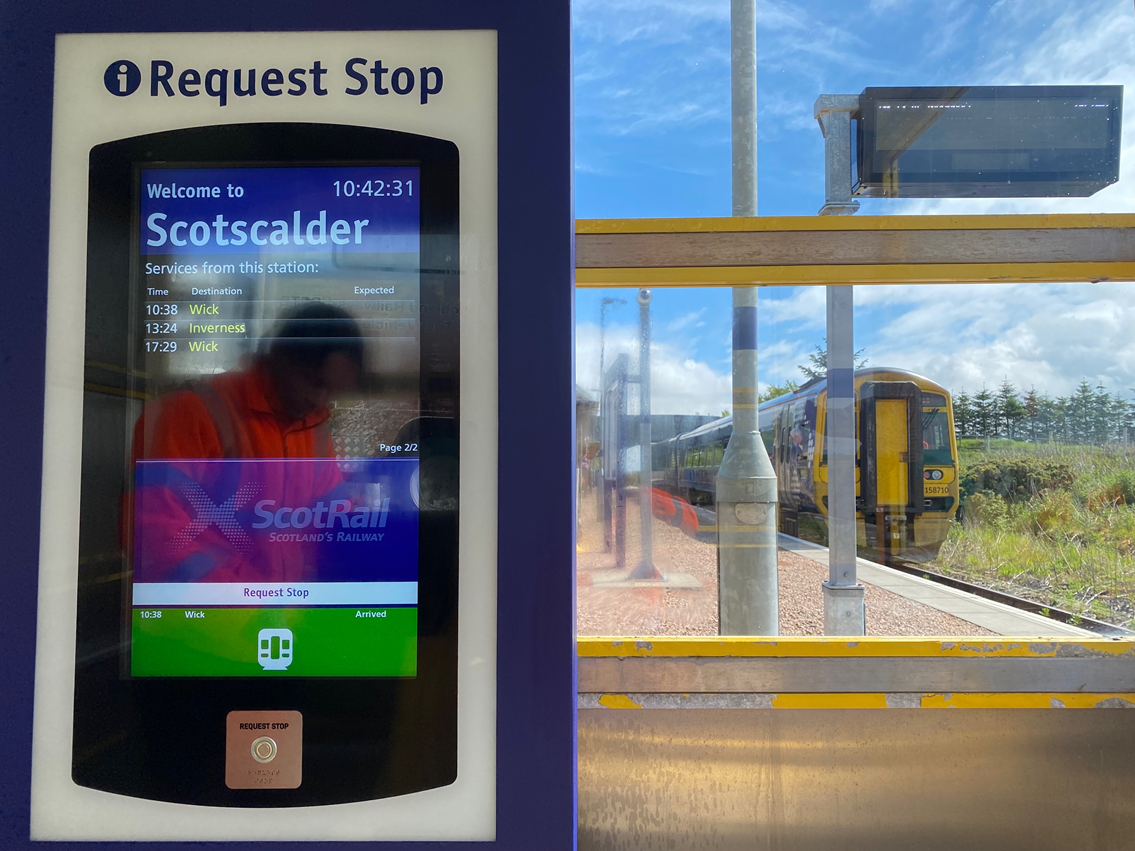Monday 19 Dec 2022
Further request-stop kiosks added on Far North Line
- Region & Route:
- Scotland’s Railway: Scotland
The next phase of the roll-out of request-stop kiosk on the Far North Line in the Scottish Highlands will go live at five locations from Tuesday December 20.
The kiosks at Kinbrace, Kildonan, Rogart, Invershin and Culrain follow the successful trial installation at Scotscalder earlier in the year.
The system allows passengers to access the next planned service electronically and eliminate the need to hand-signal the driver to stop the train.
The roll-out is part of a broader £5m package of investment in the line's radio signalling system, with stations on the Far North Line benefiting from the addition of the request-stop kiosks on platforms.
Kiosks at Altnabreac and Dunrobin Castle will complete the programme and be activated early in 2023 to bring the total to eight.
Due to their geographical remoteness, patronage at these stations is amongst the lowest in the UK and consequently they operate on a ‘request to stop’ basis – currently requiring the need to hand-signal approaching trains to stop.
The new kiosks will enhance the current operation of the railway by allowing passengers to request an approaching train to stop at the station with just the push of a button using a radio system to send a message to the driver’s cab.
Passengers onboard wishing to leave the train at these stations will continue to speak to the guard / conductor as at present.
Scotscalder was the pilot station for the system and following installation, it was monitored to ensure safety and reliability. During its trial, Information was available on platforms to highlight the change to passengers and a period of dual running was used to test the enhanced system prior to it being rolled-out at the other locations.
As well as the installation of the request-stop kiosks, Network Rail has upgraded existing radio communication masts and antennas and installed new equipment at Muir of Ord, Invergordon, Kildonan and Wick stations to enhance radio coverage.
This has improved the reliability and resilience of the communications network across the route to improve overall passenger experience for those travelling on the Far North Line.
Cara Healy, Network Rail’s development manager for the work on the Far North Line, said: “Enhancing the radio network will make the experience of using request-stop stations more straight forward for local people and for the increasing number of tourists visiting the area.
“Following the successful trial-period at Scotscalder, the system is now ready to be rolled out at a further five locations to improve performance and the overall passenger experience for those travelling on the railway.
“This new system makes it easier to use some of the most remote stations on our network and hopefully help encourage more people to travel into the Highlands to walk, climb, cycle and sightsee.”
David Simpson, ScotRail Service Delivery Director, said:
“I’m delighted to see more request-stop kiosks being introduced on Scotland’s Railway.
“By enabling the driver to be alerted in advance of the need to stop in the station, rather than being reliant on hand-signalling, it delivers a safer and more reliable system, and means that trains don’t need to slow down at stations where there are no passengers waiting.
“The new request-stop kiosks will help improve our customers’ experience as well as our train performance. It’s a really positive step for the operation of the Far North Line.”
If anyone has any questions or concerns in relation to the project, they can call our 24-hr helpline on 03457 11 41 41 or visit the Far North Line page on the Scotland’s Railway web site.
Notes to Editors
Installation of ‘request stop kiosks’
Scotscalder, (Trial period from August 2022)
Kinbrace, Kildonan, Rogart, Invershin, Culrain (From December 20)
Altnabreac, Dunrobin Castle (Spring 2023)
Upgraded or additional radio communications equipment
Kildonan, Muir of Ord, Invergordon and Wick.
Request-stop kiosks consist of a platform unit with timetable display and request to stop button, signage and an adjacent radio mast.
The radio network on the line has been enhanced which has allowed the introduction of the kiosks which enable requests to be made direct to the cabs of drivers approaching the stations.
Contact information
Passengers / community members
Network Rail national helpline
03457 11 41 41
Latest travel advice
Please visit National Rail Enquiries
Journalists
Network Rail press office - Owen Campbell
NR Press Office 0141 555 4108 / 07515 617073
Owen.Campbell1@networkrail.co.uk
About Network Rail
We own, operate and develop Britain's railway infrastructure; that's 20,000 miles of track, 30,000 bridges, tunnels and viaducts and the thousands of signals, level crossings and stations. We run 20 of the UK's largest stations while all the others, over 2,500, are run by the country's train operating companies.
Usually, there are almost five million journeys made in the UK and over 600 freight trains run on the network. People depend on Britain's railway for their daily commute, to visit friends and loved ones and to get them home safe every day. Our role is to deliver a safe and reliable railway, so we carefully manage and deliver thousands of projects every year that form part of the multi-billion pound Railway Upgrade Plan, to grow and expand the nation's railway network to respond to the tremendous growth and demand the railway has experienced - a doubling of passenger journeys over the past 20 years.
Follow us on Twitter: @networkrail
Visit our online newsroom: www.networkrailmediacentre.co.uk

